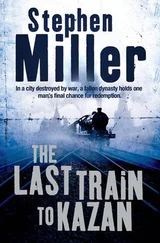Mary Miller
THE LAST DAYS OF CALIFORNIA
A NOVEL
For my parents,
Dolores and Curt
It was Wednesday and we hadn’t even made it to Texas yet. We’d been sleeping late, swimming during daylight hours, but we were going to have to move if we wanted to make it to California in time.
In a shitty little town in Louisiana, which was full of shitty little towns, we stopped at a Waffle House and sat at the counter. My father liked to sit at counters because he liked to be among the people—you couldn’t just ask if they’d been saved, you had to win them over first, had to make them like you—but there was no time left for niceties. He had brought along a bundle of tracts that said “All Suffering SOON TO END!”
When the waitress asked how we were doing, he handed her one.
“The world is passing away,” he said, “but those who do the will of God will remain forever.”
In response, she set a tiny napkin in front of him with a knife and fork on top. Then she moved down the line: my sister, Elise, and my mother and me.
I watched my father, who was looking around pleasantly to see if there was anyone who might be willing to talk to him. There wasn’t. There hardly ever was. He was either preaching to the choir or trying to convert the unconvertible, but it didn’t stop him from going through the motions—the futility of it was central, necessary. He didn’t really want all 7 billion people on the planet to be saved. We wouldn’t be special then. We wouldn’t be the chosen ones.
I set my elbows on the counter. It was sticky with syrup, and I liked that this Waffle House was like every other Waffle House I’d ever been to. I knew where the bathroom was and what I wanted to eat and what it would taste like.
I peeled my elbows off the counter and looked at them.
“Excuse me, miss,” my mother said, too quietly for the waitress to hear her. “Excuse me,” she said again, louder.
The waitress came over and stood in front of us. She was tall and hulking and had a missing tooth, or maybe it was just a large gap—the space didn’t seem quite big enough for a tooth. I stared at her openly. She was ugly and I wasn’t afraid of ugly people.
“This counter is sticky,” my mother said, touching it with her finger.
The waitress left and came back, wiped it off with a dirty-looking rag.
Elise dug around in her purse and pulled out her lip gloss. She smeared it on her bottom lip and top lip and pressed them together. It was almost obscene, watching her put on makeup. Boys frequently told me she was a knockout and then waited expectantly for my response. Of course there was nothing to do but agree. She was a knockout and I wasn’t. What was there to say about it?
“Why don’t y’all go clean up?” our mother asked. Neither Elise nor I said anything. We didn’t respond to suggestions, only direct orders.
I brought my hands to my face. “Clean as a whistle,” I said.
“I wonder where that saying comes from,” my sister said. “Whistles aren’t clean, they’re full of spit.” She got out her phone and Googled it, and I watched her face as she read, the dents at the tops of her eyebrows. “‘One possibility is that the old simile describes the whistling sound of a sword as it swishes through the air to decapitate someone, and an early nineteenth-century quotation suggests this connection: a first-rate shot, his head taken off as clean as a whistle.’”
She hopped off her stool and I turned to watch her go, ponytail and hips swinging. It was how she walked down the halls of our high school. She never looked at anybody and made people call her name again and again before turning. She was wearing her King Jesus Returns! t-shirt with a pair of shorts that were so short you couldn’t tell she was wearing them. I saw a man watching her, too, a mean-looking little man with a girl on his lap. The girl was skinny with big joints and glasses, one arm choking a ratty stuffed animal. He pulled her thumb out of her mouth and she put it back and he pulled it out and she put it back in again. I looked around at the other diners: they were all hideous. I could live easily in a town like this.
The man’s food came and he scooted the girl off of his lap and dug in. She reached for a triangle of toast and he slapped her hand.
“Ask first,” he said, but she didn’t ask and he didn’t give it to her. I imagined a scenario in which the girl had been kidnapped years ago. She’d been with him so long that she had forgotten any other life ever existed.
My mother reached over me to get a packet of Sweet’n Low and I leaned back in an exaggerated manner. She smelled bad, like a wounded animal. She had gotten her period as soon as we’d left Montgomery, and it reminded me that I hadn’t showered in days. I’d gone swimming last night, though, had stayed in the pool for hours listening to Elise talk to a boy who was selling magazines across the country. Every morning, the boy woke up early and drove to a different town. He didn’t have time to see anything or do anything and he ate fast food off dollar menus to save money. He wanted to go home, but he had barely made anything after his expenses—he might even end up owing them . It was modern-day indentured servitude, he’d said. I’d been waiting for Elise to one-up him with her pregnancy, or to tell him that our father was driving us twenty-five hundred miles so that we would be among the last people in the Continental U.S. to witness the coming of Our Savior, the Lord Jesus Christ, but she didn’t say anything except that we were going to see the Pacific Ocean.
Elise sat back down and poured two creamers into her coffee, stirred it with a fork. She drank coffee every morning now; she’d drink cup after cup and hold up her hand so I could watch it shake.
When the waitress returned, my father ordered a T-bone and my sister ordered a waffle and my mother ordered a Fiesta Omelet and I ordered a hamburger. Elise had stopped eating meat six months ago, but I’d catch her stealing glances at our pulled pork sandwiches, our sausage-filled side of the pizza. She had a whole spiel about animal rights and the environment and the nutritional requirements of the human body and our father had his own spiel—he said if people stopped eating meat, animals would overrun our cities and wreak havoc and the economy would crash. He said if meat weren’t available, people would turn to cannibalism.
My father searched his pockets and went outside, came back and divvied up a thin newspaper. He handed me the entertainment section, and I read my horoscope and checked to see what was coming on TV later. I hoped my sister and I would have our own room again so we could watch whatever we wanted.
“ Honey, I Shrunk the Kids is on at eight,” I said, leaning over my mother to show Elise. We loved movies from the 1980s, the ridiculous clothes and graphics, the clunky phones and boom boxes. We liked The Last Starfighter, Sixteen Candles, The Goonies . We liked anything with Andrew McCarthy and Judd Nelson, who were so old now. If they were raptured, they’d be restored to their former beauty. I liked Andrew McCarthy best in Less Than Zero , Judd Nelson in The Breakfast Club . Molly Ringwald was never pretty enough to be a leading lady, but the eighties were a dream world in which the captain of the football team would leave the homecoming queen for an awkward red-haired girl who made her own clothes.
I watched the cook break my patty off a stack and place it on the grill. He seasoned the steak and cracked eggs into a bowl, moving so fast he seemed to be doing all of these things at once. He wore a little paper hat to distinguish himself. It was a nice touch, old-timey. I picked up the entertainment section again and read Elise’s horoscope. I wanted to tell her what it said, but our parents thought horoscopes were evil because the only one who knew what was going to happen was God. Elise’s advised against extended travel, which she would have found amusing. Mine said I was on an information-gathering mission of sorts—I was to keep my questions unstructured and people were going to tell me the most unusual facts about themselves and the world. I liked the sound of this, particularly the “of sorts” part. My mission could be whatever I wanted.
Читать дальше













